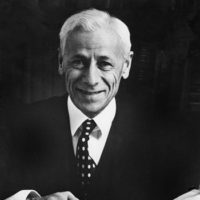
Michael Heidelberger
Columbia University
For the development of immunochemistry.
Rarely does it happen that one man working in a science which borders upon many related fields is able to make contributions so decisive as to permit all of these fields to advance more rapidly.
Trained as an organic chemist, his earlier years were devoted to elucidating relationships between chemical structure and specificity in the fashioning of chemotherapeutic agents. Becoming interested in the type specificity of pneumococci, his discovery with Oswald Avery of the pneumococcal polysaccharides placed in his hands the tool par excellence for the study of immunological specificity, and led him to the development of quantitative methods for the measurement of antigens, antibodies and complement and to a quantitative theory of their interaction.
These methods established the new subscience of immunochemistry upon the firm foundations of analytical chemistry, and made possible the measurement of traces of proteins and carbohydrates with an accuracy and specificity not obtainable by any other method. Their extensive development under his leadership and inspiration has made them indispensable in protein and carbohydrate chemistry, to which they provide unique criteria of homogeneity and purity and make possible the perception of otherwise unapparent structural similarities and differences. They have been and continue to be decisive in the evaluation of the effectiveness of immunization procedures in man and in the elucidation of the mechanisms of allergic reactions, of the pathogenesis of a variety of diseases of unknown etiology, and of the formation of antibody and other serum globulins.
The transformation of immunology from a largely descriptive science which applied bizarre names to odd properties of ill-defined or hypothetical substances to immunochemistry—the precise and keen cutting tool by which many ragged edges in science have been planed away and intrinsic structure clearly revealed—is the contribution of Michael Heidelberger.
